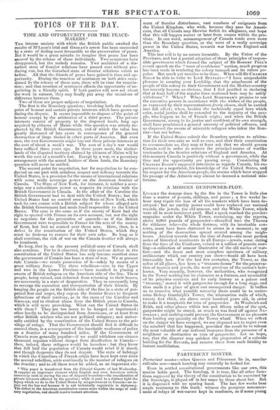A MODERN GUNPOWDER-PLOT.
LUCKILY the damage done by the fire in the Tower is little else than a matter of pounds, shillings, and pence ; a few weeks' la- bour may repair the loss of all the muskets which have been de- stroyed: but no earthly power could have replaced our national records, the jewels, the old armour, and the White Tower, which were all in most imminent peril. Had a spark reached the powder- magazine under the White Tower, containing, say the reports, above 9,000 pounds of gunpowder—shovelled into the Thames for riddance sake—the whole fortress, with its invaluable con- tents, must have been shattered to atoms in a moment ; to say nothing of the destruction spread around among the neigh- bours. Ancient records from the time of Jousr—the most perfect series of historical muniments in all Europe—jewels, some dating from the time of the Confessor, valued at a million of pounds ster- ling—a collection of armour illustrative of the old modes of war- fare—and the finest and most complete specimen of military, architecture which our country can show—would all have been irrevocably lost. For the last five centuries, the Tower, as the safest of all places, has been a " treasure-house " for the preserva- tion of records and jewels, the most precious of the nation's heir- looms. Very recently, however, the authorities, who recognized in the Tower nothing but its character as a fortress, and unmindful of its priceless contents and its early history as a palace and "treasury," stored it with gunpowder enough for a long siege, and thus made it a place of great and unsuspected danger. It baffles us to conceive what possible necessity there could be to under- mine Bishop Gundulph's Tower, the adamantine walls of which, twenty feet thick, are above seven hundred years old, in order to make it a receptable for tons of gunpowder. At Woolwich and Erith, and other places within ten and fifteen miles of the spot, gunpowder might be stored, as much as was fired off against NA- POLEON; and nothing could prevent the Government at its pleasure from landing any quantity on the Tower wharf. When we reflect on the danger we have escaped, we are disposed not to regret even the mischief that has happened, provided the result be to release the most valuable of our national treasures from the presence of a neighbour so destructive as tons of gunpowder. Let us hope, too, that the disaster may quicken the preparation of a suitable building for the Records, and remove them from such liability to instant annihilation.


























 Previous page
Previous page